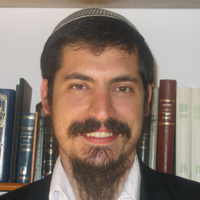Beit Midrash
- Torah Portion and Tanach
- D'varim
- Ki Tetze
The story is told of a brother and sister who set out to search for spirituality. Each one found something: The brother found and returned to Judaism, while his sister fell under the influence of a guru in India and decided to remain there.
The brother felt bad about his sister and her decision to forego a life of Torah. He tried to get her to return to Israel and learn about Judaism, but she was happy where she was and refused to entertain his suggestions. Finally, though, after he simply didn't give up, she agreed to return to Israel for just a few days and take part in one, and only one, Torah class. Her brother, of course, prepared feverishly for this once-in-a-lifetime opportunity, and sought the best possible lecturer on the most fascinating Torah topic he could think of.
The two siblings arrived at the class, took their seats, and waited for the lecture to begin. They waited and waited, until finally a man got up and said, "Due to unforeseen circumstances, the lecturer will not arrive. However, I can speak in his place, though on a different topic." And he began to speak – about the Jewish laws of finding and returning lost objects…
The brother realized sadly that his one chance was lost, although he saw his sister listening politely to the lecture. When it was over, she got up and returned to India forthwith.
One day soon after, as she was walking with her guru, they saw a wallet on the street, practically overflowing with money. They also found in it identification papers of the apparent owner. The girl was about to pick up the phone and call, when the guru stopped her and said, "No need. The money belongs to us, the finders – for the universal cosmos, in its infinite kindness, has clearly decided to grant us this gift." At that moment the girl remembered the lecture that she had heard – and immediately ordered a plane ticket home to Israel, where she became a fully observant Jewess.
This story expresses not only the value of the mitzvah of Returning Lost Items, featured in this week's Torah portion, but also a very fundamental spiritual truth – one that can shed light on this month of Elul and all the teshuva (introspection and repentance) that comes along with it.
Just as we say that man's belongings are connected to him, and that even if he loses them, they are still his and we are commanded to return them to him [if he can identify them], so too man's deeds are connected to him and he can rectify and raise up even the corrupt deeds that he performed in the past.
As Rav Kook teaches: "One's desire is connected to his actions [both future and past]. Even one's past deeds are not detached from the essence of [his] life and desire, as nothing ever becomes detached completely. One's desire can imprint a special character on past deeds as well, and this is the secret of teshuva." (Orot HaTeshuvah 6,5)
Teshuva is actually a form of returning lost objects – for when we sinned, we took the strengths that G-d gave us and used them against His will, thus "losing" them, and when we do teshuva, we return them to Him.
This principle sheds a special light on the teshuva that we do in the month of Elul. We generally think of Elul as an introduction to, and preparation for, the High Holidays. We make a type of deal with G-d: "We'll do teshuva in Elul, and You inscribe us to a new sweet year on Rosh HaShanah and Yom Kippur." This concept is of course rooted in true holiness, and there are many sources that attest to it – but it would seem that we can ascribe to Elul an even greater level than just that of preparation for the following month.
We know that the "end" of something is its climax and perfection. For instance, the Third Meal of the Sabbath is called the "Desire of Desires," that is, the highest level of Divine Will and therefore the highest level of the Sabbath altogether.
The period known as a "year" builds, for the world, another spiritual level (Maharal of Prague, Gvurot Hashem, 5,46); each year brings its spiritual climb. Thus, Elul, the last month of the year, is its completion and climax. During Elul, we are still in the midst of the year's special spiritual ascent, but we are nearing its end, when we can give a final push and ensure that all its strengths are directed towards G-d. Good people don’t like to do half-jobs, and therefore Elul is when we fill in for whatever we might have missed during the previous 11 months, and restore all the lost, wasted and abused strengths to Hashem.
Looking at Elul in this manner turns it into a month that is filled not with fear of what the new year will have in store, but rather with happiness at knowing that, as Rabbe Nachman of Breslov taught, "there is no [need for] despair in the world at all." No one will ever be lost, and it is within our abilities to rectify and raise up whatever we did in the past.
In order to get articles like this delivered straight to your inbox every week, subscribe to the Israel National Torah newsletter here.

Two Types of Hate
Rabbi Jonathan Sacks Z"tl | Elul 5 5777

The Secret to Israel's Victory in War
Rabbi Ariel Farajun | Elul 13 5782

Family:Foundation of the Nation's Life
Rabbi David Chai Hacohen | 10 Elul 5784























